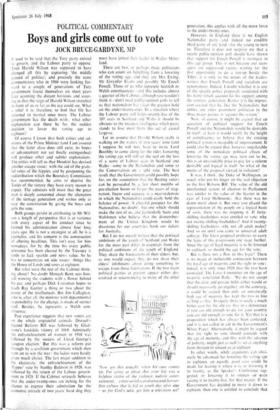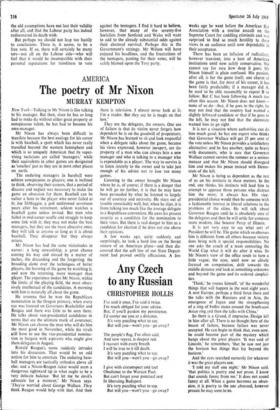Boys and girls come out to vote
POLITICAL COMMENTARY JOCK BRUCE-GARDYNE, MP
It used to be said that the Tory party existed to govern, and the Labour party to oppose. Then Harold Wilson was supposed to have changed all this by capturing 'the middle ground of politics'; and precisely the same commentators who in 1960 were looking for- ward to a couple of generations of Tory government found themselves six short years later scanning the distant horizons and assur- ing us that the reign of Harold Wilson stretched in front of us as far as the eye could see. What a relief it is, therefore, to find that life has returned to normal once more. The Labour government has the death wish: what other explanation can there be for the sudden decision to lower the voting age to eighteen?
Of course I know that both critics and ad- mirers of the Prime Minister (and I am assured that the latter class does still exist, its hopes of advancement not yet finally extinguished) will produce other and subtler explanations. The critics will tell us that Houdini has devised another escape route: with the aid of the grate- ful votes of the hippies, and by postponing the redistribution which the Boundary Commission has recommended, he aims to deprive the Tories of the victory they have every reason to expect. The admirers will insist that the great man is deeply concerned about the alienation of the teenage generation and wishes only to save the constitution by giving the boys and girls the vote.
Both groups persist in attributing to Mr Wil- son a length of perspective that is at variance with every aspect of his conduct since he formed his administration almost four long years ago. He is not a strategist at all, he is a journalist, and his concern is the construction of alluring headlines. This isn't easy for him nowadays, for by the time his every public utterance has been cleared by the Treasury it tends to lack sparkle and news value. So he has to concentrate on side issues: things like the House of Lords and votes at eighteen.
But what were the rest of the Cabinet think- ing about? No doubt Mintech Benn sees him- self wowing the students with a flower behind his ear, and perhaps Dick Crossman hopes to teach Ray Gunter a thing or two about the power of the intellectuals. But Jim Callaghan, %%ho is, after all, the minister with departmental responsibility for the change. is made of sterner stuff. Besides, he represents a Welsh con- stituency.
Past experience suggests that new voters are on the whole ungrateful animals. Disraeli's Second Reform Bill was followed by Glad- stone's landslide victory of 1868. Admittedly the enfranchisement of women in 1918 was followed by the success of Lloyd George's 'coupon election.' But this was a reform put through by a coalition government which then went on to win the war: the ladies were hardly given much choice. The last major addition to the electorate, the enfranchisement of the 'flapper' vote by Stanley Baldwin in 1928. was followed by the return of the Labour govern- ment in 1929. If the Cabinet seriously believes that the under-twenty-ones are itching for the chance to express their admiration for the economic miracle of two years' hard slog they must have joined their leader in Walter Mitty- land.
There are two, or perhaps three, politicians who can count on benefiting from a lowering of the voting age, and they are Mrs Ewing. Mr Gwynfor Evans and possibly Mr Enoch Powell. Those of us who represent Scottish or Welsh constituencies--and this includes almost a quarter of the Cabinet, although you wouldn't think it—don't need public-opinion polls to tell us that nationalism has taken the greatest hold on the under-twenty-ones. In a situation where the Labour party still holds seventy-five of the 107 seats in Scotland and Wales it should be obvious to the meanest intelligence which party stands to lose most from this act of casual largesse.
Let us assume that Harold Wilson really is walking on the waters in two years time (and I suppose he will now have to invite Lord Boothby to come along for the ride). Lowering the voting age will still set the seal on the loss of a score of Labour seats in Scotland and Wales—some to the Nationalists and some to the Conservatives on a split vote. The best result that the Government could possibly hope for, on the assumption that the floating voters can be persuaded by a few short months of pre-election boom to fo:-get the years of stag- nation, freeze and squeeze. is a near-stalemate in which the Nationalists could easily hold the balance of power. A cheerful prospect for the Nationalists, no doubt: but one which should make the rest of us. and particularly Scots and Welshmen who believe that the dismember- ment of the United Kingdom would be disastrous for our countries, book our tickets for Australia.
But I do not myself belie‘e that the political ambitions of the youth of Scotland and Wales for the most part differ in essentials from the political ambitions of the youth of England. They share the frustrations of their elders, but, as one would expect. they do not share their elders' inhibitions about doing something to escape from those frustrations. lithe two main political parties at present appear either dis- credited or unconvincing to many of the older
'Now get this straight, when his case comes up. I'm going to plead that your kid was a helpless victim of the violence, sadistic enter- tainment, crime-serial-war-drama-and-horror- film culture that is fed to youth day after day —so for God's sake, get him a television set!'
generation, this applies with all the more force to the under-twenty-ones.
However, in England there is no English Nationalist party—and indeed no credible third party of any kind—for the young to turn to. Therefore it does not surprise me that a recent public-opinion poll should have shown that support for Enoch Powell is strongest in this ace group. This is not because our teen- agers are suppressed racists, waiting for the first opportunity to do a ton-up beside the Tiber; it is only in the minds of the leader- writers that Enoch Powell and racialism are synonymous. Indeed, I doubt whether it is any of the specific policy proposals associated with his name w Inch account for his support among the younger generation. Rather it is the impres- sion created that he, like the Nationalists, but unlike any other prominent politician in the three major parties. is 'against the system.'
Now, of course, it might be argued that an
accretion of political support for Enoch Powell and the Nationalists would be desirable in itself: at least it would surely be the height of complacency to belie %e that the existing sstem is incapable of improvement., It
could also he argued that, hots es er unpalatable some of the immediate political effects of lowering the swing age may turn out to be, this is an unavoidable price to pay for a reform desirable and logical in itself. So what of the merits of the proposal viewed in isolation?
It %as, I think. the Duke of Wellington, as
usual, who put his finger on the real objection to the first Reform Bill. The value of the old unreformed system of election to Parliament was similar to the value of the Garter in the eyes of Lord Melbourne: that there was no damn merit about it. But once you placed the representation of the people on a logical basis of sot ts. there was no stopping it. If forty- shilling freeholders were entitled to vote, why not twenty-shilling freeholders? And if twenty- shilling freeholders. why not all adult males? And so on until you came to universal adult suffrage. The latest proposal professes to carry the logic of this progression one stage further. Since the ace of legal majority is to be lowered to eighteen. so should the age for the vote.
But is there not a flaw in this logic? There is no magic or ineluctable connection between the legal age of majority and the right to vote:
indeed. it is only since 1928 that the two have coincided. The Latey Committee on the age of majority concluded flatly : 'We do not accept that the civic and private fields either would or should necessarily go together; on the contrary, it could be argued then only an unnaturally high age of majority has kept the two in line as long as this.' In equity there is surely a much better case for the old cry that in a democracy if you are old enough to die for your country you are old enough to vote for it. Yet that is a proposition which has always been contested, and it is not called in aid in the Government's White Paper. Alternatively, it might be argued that the right to vote should coincide with the age of maturity, and this, with the advance of puberty, might just as well be set at anything from thirteen to sixteen as at eighteen.
In other words, while arguments can obvi-
ously be advanced for lowering the voting age to eighteen, an equally good case could be made for leaving it where it is. or lowering it to twenty, as the Speaker's Conference sug- gested, or lowering it to sixteen—or even raising it to twenty-five, for that matter. If the Government has decided to move it down to eighteen, then one is entitled to conclude that
the old assumptions have not lost their validity after all, and that the Labour party has indeed rediscovered its death wish.
But perhaps we should not leap too hastily to conclusions. There is, it seems, to be a free vote. If so, there will certainly be many MPS—not all on the Labour side—who will feel that it would be incompatible with their personal reputations for trendiness to vote
against the teenagers. I find it hard to believe, however, that many of the seventy-five Socialists from Scotland and Wales will want to add to the already substantial odds against their electoral survival. Perhaps this is the Government's strategy. Mr Wilson will have enjoyed his headlines, and the frustrations of the teenagers, panting for their votes, will be safely blamed upon the Tory party.







































 Previous page
Previous page